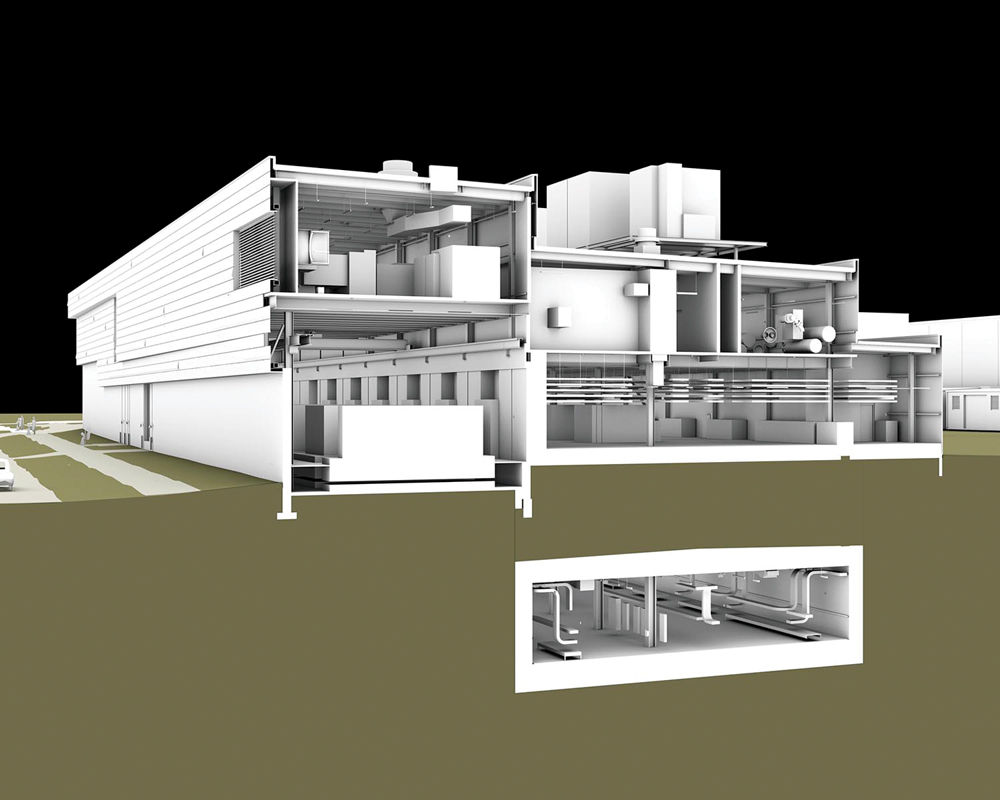Automated clash detection. Been there, done that. Quantity takeoffs. Mastered it. Virtual construction coordination. Old news.
More than 25 years after the first BIM software tools came to market, the U.S. construction industry has largely mastered the BIM/VDC learning curve and is implementing 3D BIM coordination on a regular basis. According to Building Design+Construction’s 2013 Giants 300 survey, 80% of the nation’s largest architecture, engineering, and construction firms have adopted BIM/VDC tools and report having earned revenue working on BIM-driven projects.
Let’s face it: Most of what’s discussed in the BIM/VDC arena today is yesterday’s news. So BD+C set out to identify the next big developments in BIM/VDC technology and implementation. We reached out to dozens of AEC firms that made our annual BIM Giants lists and asked one simple question: What does BIM 2.0 look like to you? Here’s what they had to offer:
Precise field-placing using robotic total stations
Structural steel items embedded in cast-in-place concrete are often misaligned or omitted in the field due to poor coordination between the structural engineer, concrete subcontractor, and steel erector. In a broader sense, the use of meta data in a building model promises great benefits, but it has not found a place in general practice because of questions of accuracy, responsibility, and liability for use of the data.
TOP BIM ARCHITECTURE FIRMS
2012 BIM Revenue ($)1 Gensler $484,286,1302 HOK $385,700,0003 HDR Architecture $299,828,0004 Perkins+Will $270,225,0005 Skidmore, Owings & Merrill $267,601,7006 HKS $216,000,0007 Stantec $197,000,0008 Cannon Design $165,000,0009 RTKL $131,834,950910 SmithGroupJJR $105,598,00011 EYP $85,381,169
TOP BIM ENGINEERING FIRMS
2012 BIM Revenue ($)1 Jacobs Engineering Group $4,465,746,0002 URS Corp. $292,864,7493 Science Applications International Corp. $131,066,2354 Arup $123,364,0285 Merrick & Co. $106,000,0006 SSOE Group $99,560,5617 Thornton Tomasetti $93,431,5458 Buro Happold Consulting Engineers $78,006,0009 Middough $60,000,0009 KPFF Consulting Engineers $60,000,000
TOP BIM CONSTRUCTION FIRMS
2012 BIM Revenue ($)1 Turner Corporation, The $5,924,000,0002 Clark Group $2,224,508,1273 DPR Construction $2,175,000,0004 Hoffman Construction $2,155,377,2765 Hensel Phelps $2,089,180,0006 Mortenson Construction $1,992,450,0007 Balfour Beatty $1,902,988,3328 McCarthy Holdings $1,879,000,0009 JE Dunn Construction $1,513,283,00510 Walsh Group, The $1,313,656,333
Even though hardware and software are available today, we lack a standard practice outlining the responsibilities of each stakeholder to create, verify, and utilize geospatial data in the BIM model.
—Steve Wilkerson, Associate Vice President, Haynes Whaley Associates
Extracting data for FM operations
The next “big trend” in BIM is the set-up, coordination, and extraction of data in COBie (Construction Operations Building Information Exchange) format so that more information can be pulled from the BIM model for use in client-based FM software, such as Maximo and AiM. The primary obstacle is figuring out how to do this when so much information for a project resides in multiple models. Programs such as BIMLink will be developed to help with the management of these “data buckets” and with the flow of that data out of and back into BIM models.
This trend will also push the AEC industry closer together, and new ways of collaborating—such as IPD multiple-party, single-contract delivery methods—will continue to evolve to help remove the obstacles to integrating data from all of the necessary parties involved.
—Sam Boyd, Quality Assurance Director, Cooper Carry
BIM on the go
Mobility is becoming more important. Multi-disciplinary teams in multiple locations collaborating on one model will require faster data networks and the use of cloud computing. Take that to the next step and design teams will be expected to instantly communicate with the construction and fabrication in the field through the model in the cloud.
We’re also going to see teams untethered from their desktops using more mobile tools (tablets, smartphones, etc.) to modify, navigate, and display the model. We are starting to work with tools that allow us to open BIM models on an iPad or iPhone to share with clients on the go.
—Don Ghent, Principal and Global Technical Leader, Gensler
Creating a common BIM language
The Industry Foundation Classes (IFC) being developed by buildingSmart International will eventually define actual data elements of a building model and standardize them industrywide. The group is working to develop and promote a standard data format that can be used across all platforms (Revit, Tekla, Bentley, etc.) so that data can be transferred and read across all model authoring and audit software programs. The walls of proprietary software will be broken down by IFC. All models will soon be able to interact with each other in ways not possible before.
—Aleisha Jaeger, LEED AP, Operations Manager-Construction, Epstein
The rise of virtual reality
The integration of BIM with virtual reality technologies is a promising development. For example, use of augmented reality—where both graphical and contextual information are overlaid onto building systems in the real world to produce the effect of x-ray vision—will allow the operator to see the utilities installed in a wall cavity, ceiling space, and even underground. The possibility of cost savings using these applications is fascinating, and the execution and user experience are quite simple (e.g., Google Glass viewer or mobile device such as an iPad).
—Andre Zoldan, Chief Information Officer, Albert Kahn Associates
Other ideas offered by the group include:
• Use of early phase database programs, such as Trelligence’s Affinity, to do programming and planning in a database-rich environment that can be directly imported into BIM programs.
• Automating code compliance review with the BIM model. The International Code Council is leading and funding the buildingSMART initiative to develop SMARTcodes, which could allow teams to automate the entire code review process.
• Establishing central project control. Building models, along with the use of RFID, barcode technology, and GPS will soon facilitate “smart” job sites. For example, materials arriving on site will automatically be sensed and recorded by the model as delivered. No paperwork will be required.
Related Stories
Luxury Residential | Jan 30, 2024
Lumen Fox Valley mall-to-apartments conversion completes interiors
Architecture and interior design firm Morgante Wilson Architects (MWA) today released photos of its completed interiors work at Lumen Fox Valley, a 304-unit luxury rental community and mall-to-apartments conversion.
Airports | Jan 30, 2024
Rafael Viñoly Architects’ design for the new Florence, Italy, airport terminal will feature a rooftop vineyard
At Florence, Italy’s Aeroporto Amerigo Vespucci, the new international airport terminal will feature a fully operating vineyard on the facility’s rooftop. Designed by Rafael Viñoly Architects, the terminal is expected to see over 5.9 million passengers annually. Renderings for the project have recently been released.
Giants 400 | Jan 29, 2024
Top 160 Workplace Interior Architecture Firms for 2023
Gensler, Interior Architects, HOK, SmithGroup, and Perkins&Will top BD+C's ranking of the nation's largest workplace interior and interior fitout architecture and architecture engineering (AE) firms for 2023, as reported in the 2023 Giants 400 Report.
Mixed-Use | Jan 29, 2024
12 U.S. markets where entertainment districts are under consideration or construction
The Pomp, a 223-acre district located 10 miles north of Fort Lauderdale, Fla., and The Armory, a 225,000-sf dining and entertainment venue on six acres in St Louis, are among the top entertainment districts in the works across the U.S.
Laboratories | Jan 25, 2024
Tactical issues for renovating university research buildings
Matthew Plecity, AIA, ASLA, Principal, GBBN, highlights the connection between the built environment and laboratory research, and weighs the benefits of renovation vs. new construction.
K-12 Schools | Jan 25, 2024
Video: Research-based design for K-12 schools
Two experts from national architecture firm PBK discuss how behavioral research is benefiting the design of K-12 schools in Texas, Florida, and other states. Dan Boggio, AIA, LEED AP, NCARB, Founder & Executive Chair, PBK, and Melissa Turnbaugh, AIA, NCARB, Partner & National Education & Innovation Leader, PBK, speak with Robert Cassidy, Executive Editor, Building Design+Construction.
Women in Design+Construction | Jan 25, 2024
40 Under 40 Class of 2023 winner Kimberly Dowdell inaugurated as AIA 2024 President
The American Institute of Architects (AIA) has announced the inauguration of Kimberly Dowdell, AIA, NOMAC, NCARB, LEED AP BD+C, Principal and Director of Strategic Relationships at HOK and BD+C 40 Under 40 superstar, as its 100th president.
Senior Living Design | Jan 24, 2024
Former Walgreens becomes affordable senior living community
Evergreen Real Estate Group has announced the completion of Bellwood Senior Apartments. The 80-unit senior living community at 542 25th Ave. in Bellwood, Ill., provides independent living options for low-income seniors.
AEC Tech | Jan 24, 2024
4 ways AEC firms can benefit from digital transformation
While going digital might seem like a playground solely for industry giants, the truth is that any company can benefit from the power of technology.
Giants 400 | Jan 23, 2024
Top 60 Parking Structure Architecture Firms for 2023
Choate Parking Consultants, Page Southerland Page, Gensler, AO, and Elkus Manfredi Architects top BD+C's ranking of the nation's largest parking structure architecture and architecture engineering (AE) firms for 2023, as reported in the 2023 Giants 400 Report.

















